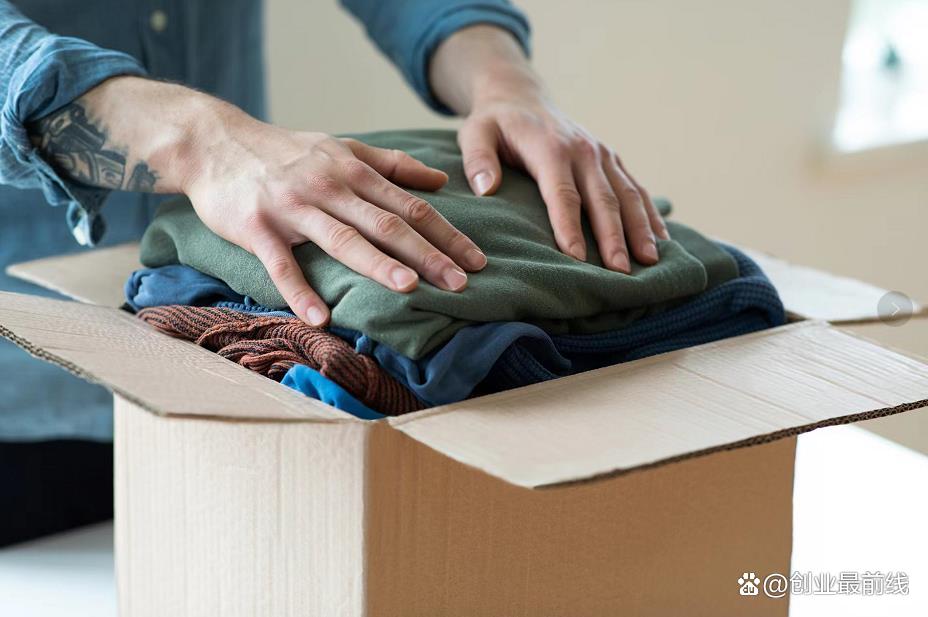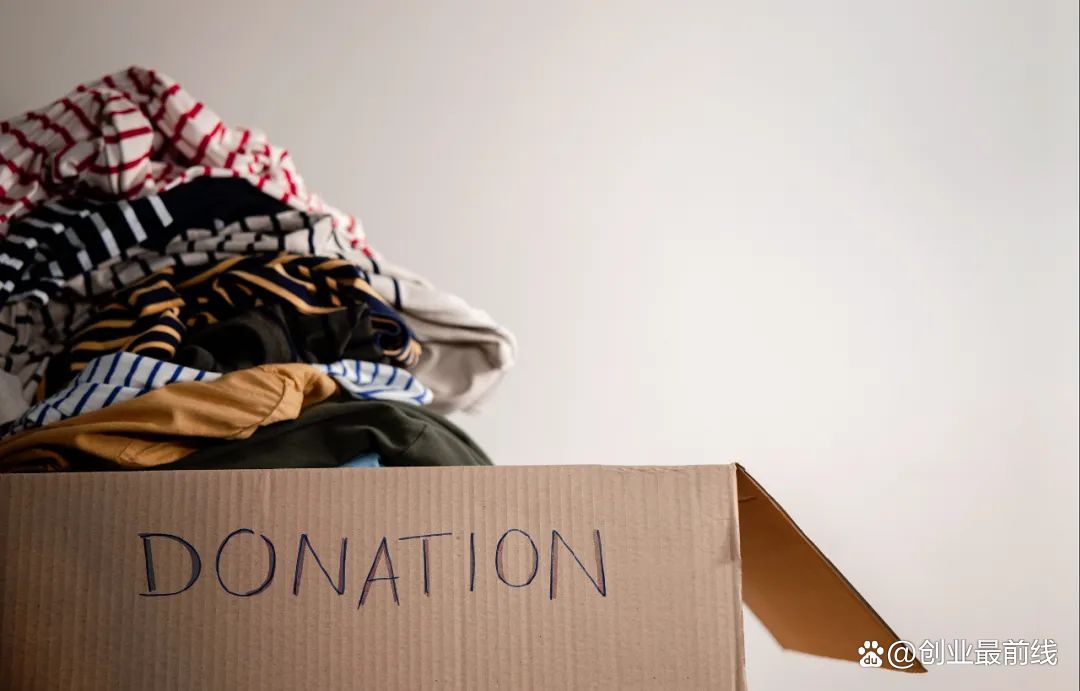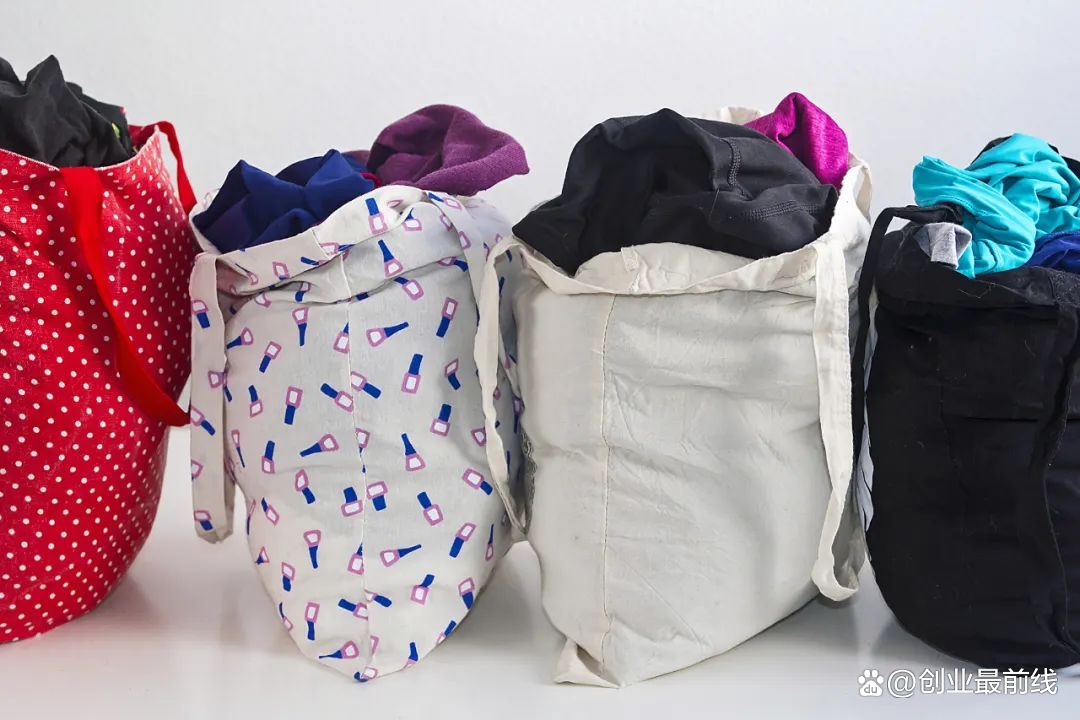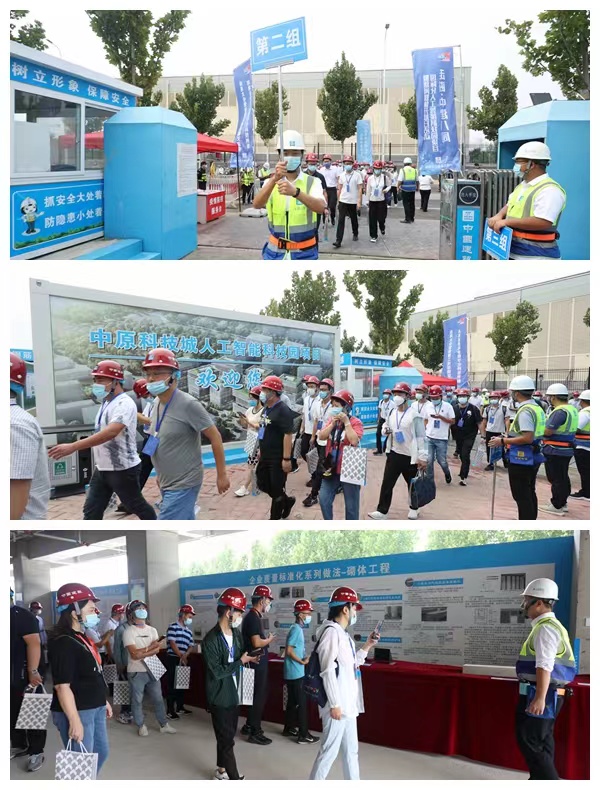The enthusiastic old clothing recycling industry: more than 10,000 investment, earning 300,000 in 8 months
Author:Starting line of entrepreneurs Time:2022.09.06

Produced | The front line of entrepreneurship
Author | Li Xiaotan
Edit | Egg
At the end of August, the old clothes that were caught by the fish sold 75 yuan were sold at a high price of more than 600 yuan, and the price turned 8 times. This news appeared on Weibo hot search. Some netizens thought that the huge huge premium of the fish was "unpredictable."
In fact, there are only a few second -hand clothes that can be sold at high prices. A large number of ordinary clothes are recycled by the "discussion", and then they are exported to Africa, Southeast Asia and other countries.
Earlier, the business opportunities of recycling second -hand clothes had been caught by some people with a keen sense of business. In addition to the "White Whale" old clothes recycling applet (also an app of the same name) that became popular in 2020, this industry is more of "Satarr You Yong" -on one person, one car, and one warehouse to start a business. In the eyes of most people, this is an industry that does not have much technical content and threshold.
According to the "front line of entrepreneurship", a 00 -year boy has a profit of 170,000 yuan in the first year of the year, and the other 80s entrepreneur earns more than 300,000 yuan in 8 months.
However, the recovery of second -hand clothes is not only a chance to start with some people, but also the sickle used to "cut leeks". Some upstream sorting plants or large -volume recycling companies use the names of franchise and training to deceive newcomers.
There are two different sides, showing the huge profits and chaos of the old clothing recycling industry. How much imagination does this industry have?
1. Low threshold business
"Why is the young man who gets rotten and finds a class?" This is what Zhang Yang has heard the most since he has been recovered by old clothes for more than a year.
In the eyes of the uncle, the work in the office is considered decent and made of money, and recycling old clothes is what the elderly do. Faced with their doubts, he chose to go back with a smile, "I earn more than your daughter, don't worry about it." These people cannot offend. In the community, they are all potential KOLs, and Zhang Yang also expects them to help publicize.
Zhang Yang, 23, has done a lot of jobs, network management waiters, electronic factories general workers, customer service, sales, and so on. The reason why he entered the old clothes recycling industry was also an opportunity to accidentally hit it -one day he accidentally saw someone recycling old clothes and went to understand the industry out of curiosity.

(Figure / Photo Network, based on VRF protocol)
"The cost is low, even if you pay too much." This is his first idea of this business, and it is also the main reason why he pulls his friends to enter the industry.
The threshold for the recycling business of the old clothes is extremely low, just one person, one car, and one warehouse. Before entering the industry, Chen Lin, Jilin Province, only bought a second -hand van for thousands of yuan, and rented a warehouse for half a year to rent, with a total investment of more than 10,000 yuan.
Zhang Yang didn't even buy a van at first, only two or three thousand yuan to buy a battery car, which was the biggest investment. Their warehouses are selected in the partner's rural home, free. In addition, he also prepared some snake -skinned woven belts, each five or six yuan, a few of them used to tie the cargo, usually three or four yuan, and a handheld electronic scale bought from Taobao for 30 yuan. Essence
In general, Zhang Yang's cost when he first entered the industry could not invest more than 3,000 yuan.
He told us that another reason for entering the industry is that he is not used to being controlled by others. He does a job of nine nights and six like robots, day after day, year after year. Compared with sales, the benefit of doing business is that there are not too many performance pressures and more comfortable.
However, after recycling the old clothes for a long time, Zhang Yang fell into another repeated process. Today, he drives a second -hand van every day, walks on the street to recycle second -hand clothes, and then simply classifies these old clothes and sell them to upstream sorting manufacturers.
"There is no technical content in this industry, and what is earned is hard money." Zhang Yang said, "Early it is greedy and black every day, moving the goods and pulling the goods, and it must be collected regardless of the wind and rain." If there is no elevator in the community, dozens or hundreds of pounds of clothes You have to carry it downstairs by yourself.
One must -have for Zhang Yang to recover old clothes is a mask for dust to prevent dust. "Don't underestimate these dusts. I just started to pay attention and coughed for several months."
In addition to the hard work of physical labor, sometimes it is not easy to receive the delivery. Especially those who have just entered the industry neither know how to recycle nor sorting.
At the beginning, Chen Lin was embarrassed to choose carefully at the client's house. After retracting all, he found that some clothes were unqualified.
Sometimes young people face some embarrassing moments when recycling old clothes.
In Africa, second -hand underwear is a sought -after goods, and sometimes the price even exceeds new clothes. Driven by this demand, second -hand underwear has become a key cargo in the recycling session.
When I first received underwear, Zhang Yang, who was in his early 20s, was embarrassed. "I dare not hold it with my hand, I can only wrap it with other clothes, and I deliberately avoid it." Because he did not check it carefully, he received a lot of it. The qualified goods can only be thrown away, and because of this, he was not spit out by his partners.
2. Entry of 30,000 to 40,000 yuan monthly
For front -line recyclers, the essence of this business is to earn differences.
"We recycled from our own hands, and the price per catty is between two hair to one yuan." Chen Lin said. After retracting, they need to sort the ball, stains, and damaged clothing, and then classify the old clothes according to different categories, and sell it to the upstream sorting factory.
The circulation channels of these second -hand clothes are mainly exported to Africa. Therefore, the summer dress is the most expensive. The price recovered by the sorting factory can reach more than 7,000 yuan per ton. Autumn and winter clothes like sweaters are only five or six hundred yuan per ton. According to the market, this price is slightly floating, and the pricing of each factory is also different. "Which price is high to whom?" Chen Lin told "the front line of entrepreneurship", "the net income per ton is between 200 and 2,000 yuan."
(Figure / some single product recycling price of a sorting plant in Hebei)

It has been nearly two years since entering this line. Chen Lin thought of a more convenient way to make money -developing the "lower -level". After receiving the clothes, he received the price and closed it to the manufacturer, which is equivalent to the "two traffickers".
In this way, his profit margin has decreased. Although the amount of receipt increases, the overall income is not much changed. The biggest benefit is to save time and effort. In the case of someone supply, Chen Lin can recover about 70 tons per month.
The best return for recyclers is not low income for recyclables.
Chen Lin entered the industry in April last year, and at the end of the year, the net income was more than 300,000 yuan. In the first year of joining the industry, Zhang Yang's money was also 170,000 yuan.
Sorting manufacturers are also actively looking for recycling agents, and the business in their mouths is more profitable.
Wang Tong, a staff member of a sorting factory in Hebei, said that mature recyclables received about 10 tons per month. In summary, the average of 5,000 to 6,000 yuan per ton was settled at a price of 5,000 to 6,000 yuan. "The cost of shaving is at least 4,000 yuan per ton." According to this calculation, some other costs are removed, and their recycles can earn 30,000 to 40,000 yuan per month.
There is no trick to recover this business of the old clothing. In order to increase the amount of delivery, the recyclers want to do their best to promote.
Online, they post on social platforms such as idle fish, rotation, and Xiaohongshu. Local customers can receive goods, and foreign customers recycle them by mail. There are more offline methods. For example, Chen Lin will drink with horn in the community, send leaflets, business cards, and advertise in the housekeeping group. Cleaning Auntie clean up to the customer, and old clothes can be sold to him.
Zhang Yang will send a small card in the community. In addition, the recyclers cooperate with the property and express delivery station to put the recycling box in the community.
"The current old clothing recycling industry is still a blue ocean, with large volume and small competition." Old clothes sorting manufacturers described this seemingly fanatic industry.
Behind this conclusion, there are corresponding data and phenomena for support.
In 2013, the statistics released by the China Resources Comprehensive Utilization Association showed that about 26 million tons of old clothes in my country were thrown into the trash bin by consumers each year.
On the other hand, the current very low recycling rate of old clothes is also one of the reasons why this industry has become the blue ocean. At the technical exchange meeting of waste textiles in 2021, Pan Yonggang, vice president and secretary general of the China Renewable Resources Recycling and Use Association, revealed that the annual recovery volume of waste textiles does not exceed 10%of the output.
These data revealed that the old clothing recycling industry has huge room for development.
3. Someone comes to "cut leeks"
Chen Lin felt that on the short video platforms such as Douyin and Kuaishou in the past two years, there have been more publicity about this industry, and many sorting manufacturers and recyclers have opened their accounts.
(Figure / Vision China, based on the RF protocol)

In order to attract more people, some people may deliberately raise the price of old clothes. For example, the price of the sorting factory recycled the summer dress is more than 7,000 yuan per ton. Some people offer a price of 10,000 or 20,000 yuan.
In this industry that developed shortly, we smelled a trace of "cut leeks".
The first way of "cutting leeks" is to sorting manufacturers or large -volume recycling companies to claim to open franchise and deceive the franchise fee.
"Some people may not have their own sorting factories, but just take you to a factory to see, it is purely cheating money." Chen Lin said.
Wang Tong revealed to the "front line of entrepreneurship" that the cost of their brand's brand is 9600 yuan. If the recyreral collects 10 tons of summer, the cost is returned. "We will provide a series of support for free in the early stage. . Each of the recyclers receive 5 tons of goods, the manufacturer will send a car to pull the goods, and the logistics costs are all borne by the manufacturer. "
Of course, not all the charges are trying to "cut chives", and the person who needs to be judged by themselves.
Another method of "cutting leeks" is that they use the banner of "teaching new entertainment to learn old clothing recycling knowledge" to deceive the training costs.
"These training courses are generally from thousands of yuan to more than 10,000 yuan." Chen Lin said. The content of teaching includes: which types of recycling standards, how to sort clothing, how to find sorting manufacturers, etc.
The basic requirements of the old clothing recycling industry are not damage, stains, staining, and baby, children and old clothes. Above these requirements, the standards of each sorting plant are slightly different. "For example, in some sorting factories, girls wearing shorts can be counted as summer, and some manufacturers cannot." Chen Lin said. Therefore, he believes that it is necessary to follow the sorting knowledge of the manufacturer's learning system.
This is indeed the fastest way for newcomers to enter the industry, but the disadvantage is that it is difficult to distinguish whether the other party is reliable.
Zhang Yang has different views on the necessity of training. "Do you still use the classification? Sorting the factory will be divided clearly." He personally sorted the factory to talk about cooperation and find out that their recycling prices and standards are another "stupid method." Chen Lin and Zhang Yang initially adopted this method. The disadvantage of this method is slow, and it takes a process from rusty to proficiency.
Before joining the industry, Chen Lin spent three months to understand the industry. After receiving the goods, he went to contact the manufacturer.
Wang Tong said that in addition to teaching franchisees to sorting clothes, they also provide how to promote, how to cooperate with each other, and how to develop their secondary agents.
"For example, you can develop your own collection point, you can talk to the waste purchase station, Cainiao Station, security, community property, cleaning and other talks." Wang Tong said, in addition, they also provided car stickers, business card posters, Yi Labao, etc. Propaganda and other materials.
But in fact, Chen Lin and Wang Yang, who have not received training, have already explored these propaganda methods in practice, and Chen Lin has also developed a lower -level agent.
With the hard work of "cut leeks" and hard work, these two attributes make people in the recycling industry of the old clothing "come in quickly and go out quickly." More and more people enter the industry, Chen Lin feels that this business is not as easy as before. Subsequently, he may also switch to other segments of the clothing industry.
In addition, another problem that practitioners need to consider is how long can the old clothes from the old clothes from going to Africa?
According to media reports, in order to promote the development of the local textile industry, some African countries have gradually stopped importing old clothes and encouraged "Made in Africa" for several years. For example, Ethiopia is vigorously developing the textile and apparel industry. The export textile clothing amount reached US $ 261 million.
Judging from this trend, it is unknown what changes will happen in our country's exported clothes industry in the future. Although from the current data, the second -hand clothing recycling industry may still be a blue ocean, but practitioners must do PLAN B. After all, no industry can make people "easily enter the month", risks and income have always been coins. Both sides.
*Note: The characters in the text are a pseudonym; the inscription in the article comes from visual China, based on the RF protocol.
- END -
What is the construction of the Central Plains Science and Technology City Artificial Intelligence Science and Technology Park? Reporter visits on the spot

Elephant reporter Xia Ping correspondent Zheng Shuo Su ShiyaoOn August 25th, Henan...
[Learn and implement the spirit of the 14th Provincial Party Congress] Jiuquan Municipal Meteorological Bureau provides meteorological services for the protection of cultural relics in the province
Recently, Jiuquan Meteorological Bureau and the Dunhuang Research Institute cooperated to provide fine weather forecast for the protection of cultural relics in 6 cave temples in the province under th